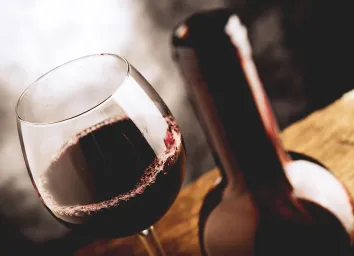What Happens to Your Body When You Drink a Bottle of Wine

We're sure you can recite 30 reasons to polish off that bottle of cabernet—you got a promotion… it's Friday… antioxidants and other benefits of wine! All can be argued, perhaps, but have you thought about the reasons you shouldn't drink a full bottle all by yourself (even if it's alongside friends)? And why it's much healthier to share the grape?
Below, we'll detail what science says about selfishly draining a bottle of wine may do to your body. But first, let's get on the same page about bottle size.
We're talking about a standard bottle, not a liter, and not a magnum. A standard bottle is 750 milliliters (ml) of wine or 25 fluid ounces. A "standard pour" of wine is 5 fluid ounces, so a bottle delivers about 5 servings. If you're only getting three glasses of wine out of your bottle, put on your glasses. Three of your giant pours are the same as five standard pours.
Here's what drinking five standard pours of wine (an entire bottle) may do to your body, according to science. Read on, and for more on healthy eating, don't miss The Danger of Drinking One Small Glass of Wine Per Day, According to Science.
It'll get a lot of liquid calories and a shot of sugar.

At about 123 calories a glass, drinking a full bottle of vino will saddle you with an extra 615 calories. But remember, that's in addition to the cheese and crackers and prosciutto you're probably munching between sips. A five-ounce glass of chardonnay contains about 1.4 grams of sugar, according to the U.S. Department of Agriculture, so a full bottle will add 7 grams to your daily intake. (Related: How Many Calories Are in Your Favorite Alcoholic Drinks?) That may not sound like a lot, but just think about all the other sources of sugar you're eating and drinking in a day. American adults consume 77 grams of sugar on average.
Your blood sugar might lower.

While you don't need the extra sugar from that wine, the good thing is that it's unlikely to raise your blood sugar. In fact, alcohol can actually lower blood sugar levels, causing weakness, dizziness, and heart palpitations. When your liver is busy metabolizing the alcohol you drank, it produces less glucose, which may cause a drop in blood sugar. That's why doctors advise diabetes to monitor their blood sugar when they've had alcohol.
You'll become legally intoxicated.

How quickly you get drunk and for how long depends on a lot of factors including your size, gender, age, drinking history, if you've eaten, how many you've had and what kind of alcohol you're drinking, among others. Most wines, though not all, contain 12% alcohol by volume (ABV). (For comparison, regular beer is 5% ABV.) Some cabernets can be 14%, some Californian zinfandels and Australian shiraz wines can have ABVs as high as 18%. And dessert wines like Port can hit 20%. But let's stick with a typical 12% ABV bottle. If you've had a full bottle, five 5-ounce servings, you can be pretty sure you're intoxicated. Whether you're a man or woman, weighing 100 pounds or 240 pounds, you've hit the impaired driving limit of 0.08% blood alcohol concentration (BAC) when you've finished your just your fourth glass. Of course, time factors into intoxication, too. Alcohol is metabolized at an average rate of 0.015g/100mL/hour. As a general rule, alcohol leaves the body at a rate of about one standard drink per hour. So if you finish a bottle of wine at 10 pm, it'll take at least until 3 a.m. for the alcohol to leave your system, according to this chart at Addiction Center.
You'll lose coordination, reaction time, and maybe miss that car horn.
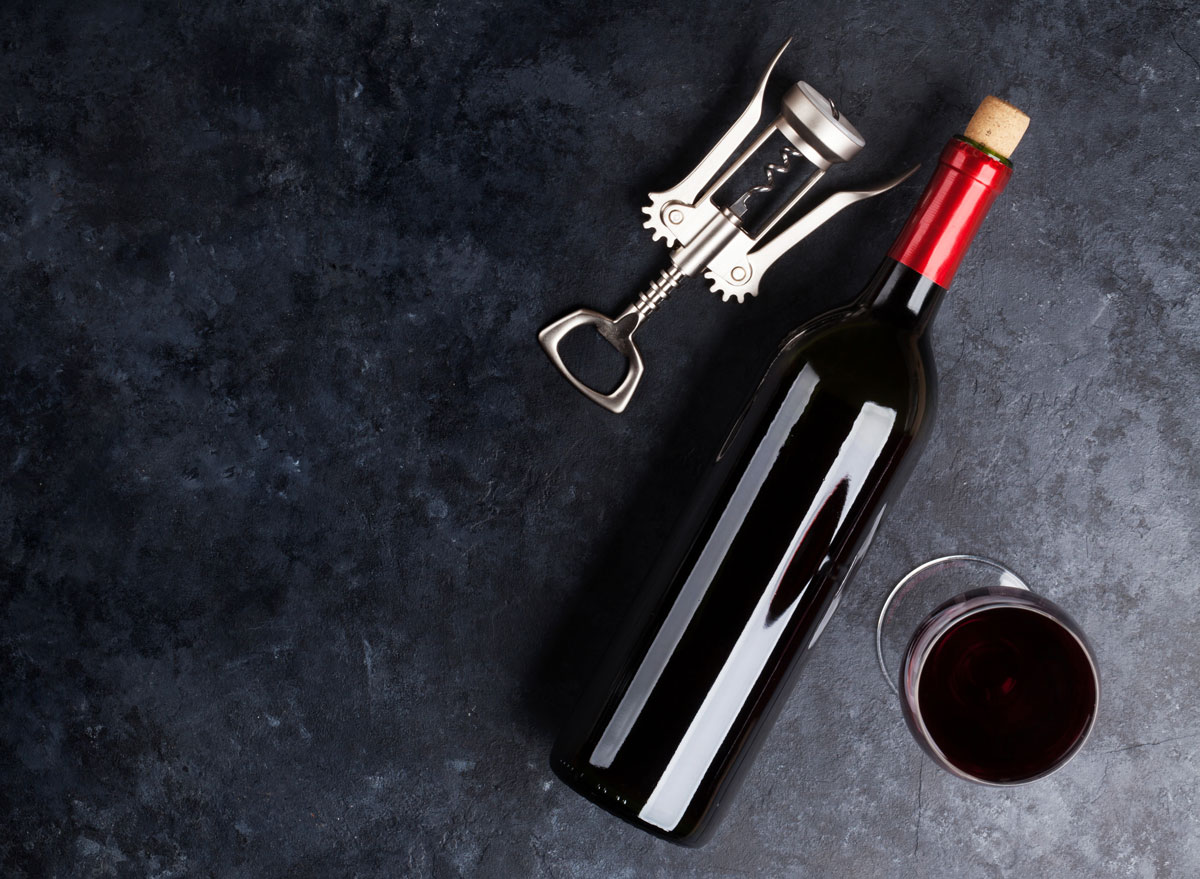
Drinking a bottle of wine will throw off your balance even when you're standing still, disrupt your coordination, and slow your reaction time, making evading obstacles much harder, according to American Addiction Centers. Even your hearing will get worse, meaning you may not notice the horn of the oncoming car you're steering toward. To learn more about the dangers of alcohol-use disorder, read This One Habit Can Cut Your Life Short by 28 Years, Says Science.
Your blood pressure and heart rate will jump.
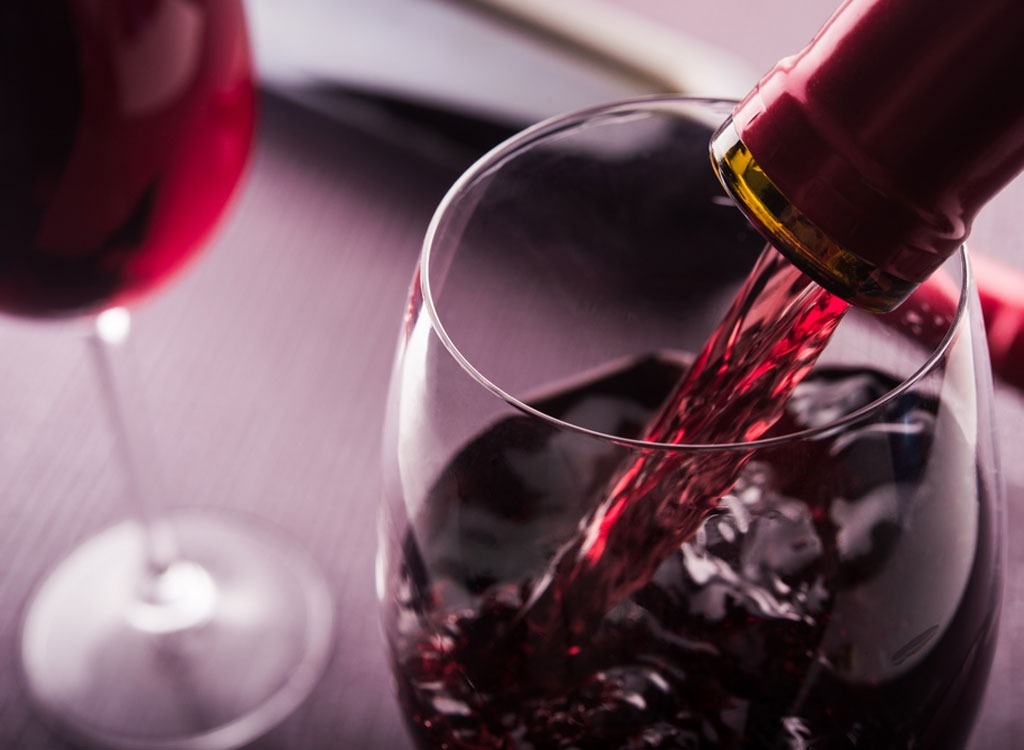
Binge drinking—and yes, emptying a bottle of wine is binge drinking—increases both systolic and diastolic blood pressure. It also elevates your pulse by about 15 beats per minute faster than when you're sober, according to the American Heart Association journal Hypertension. As blood alcohol levels decrease overnight after an evening of drinking, both blood pressure levels typically fall below the basic level. This rapid change in blood pressure values can increase the likelihood of stroke, which has been seen in increased numbers among young adults during weekends and holidays, the study in Hypertension found.
Your body will put the brakes on fat burning.
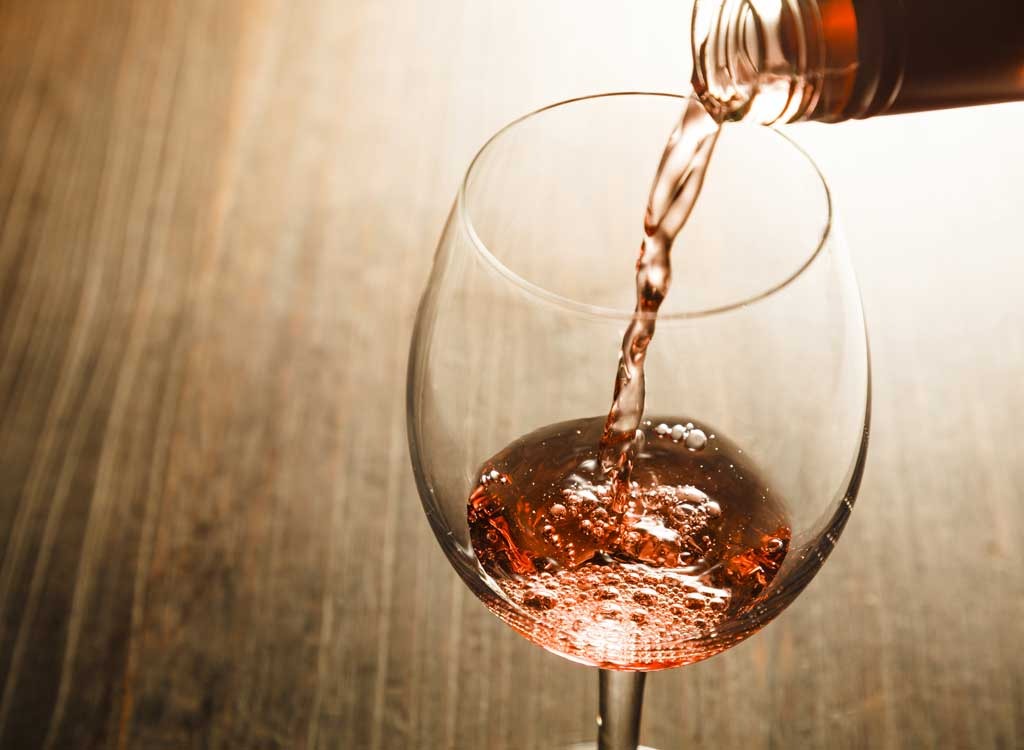
Given the choice of fuel, your body will always burn alcohol first. That means drinking a bottle of wine will flood your system with enough alcohol to effectively shut down fat-burning for quite a while. In a study in the American Journal of Clinical Nutrition, a group of men were given two alcoholic beverages, a total of 24 grams of alcohol. Several hours later, researchers tested their blood and found that their whole-body lipid oxidation (how much fat the body burned) had dropped 73%. Twenty-four grams of alcohol is just shy of the 28 grams you'd get from two glasses of wine, so you can imagine how focused your body will be on burning fat after drinking 5 servings of wine. To reverse the damages the next day, try 5 Ways to Hack Your Workout for Faster Fat Loss.
It'll make you want to order takeout.
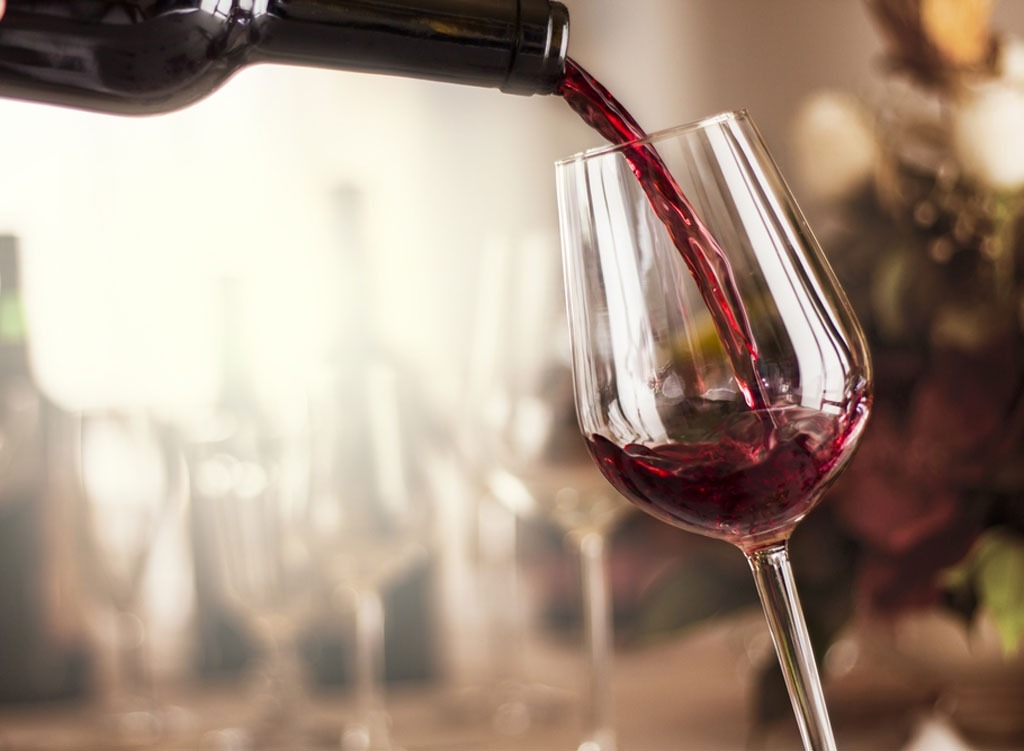
Even if you're having cheese and grapes with that bottle, you'll likely want more food after you're finished. Using MRI technology to check the brains of drinkers, researchers from the Indiana University School of Medicine found that getting drunk promotes binge-eating. It does this by increasing activity in the hypothalamus and other areas of the brain that regulate eating behaviors. What's more, drinking has been shown to enhance your sensitivity to the smell of food. The munchies effect of pounding a bottle of vino can be quite strong. Consider the results of a survey of 2,000 members of the weight-loss organization Slimming World in the United Kingdom, which showed that drinking three giant pours of wine can result in a person eating an extra 6,300 calories over the next 24 hours.
You may get a stuffy nose.
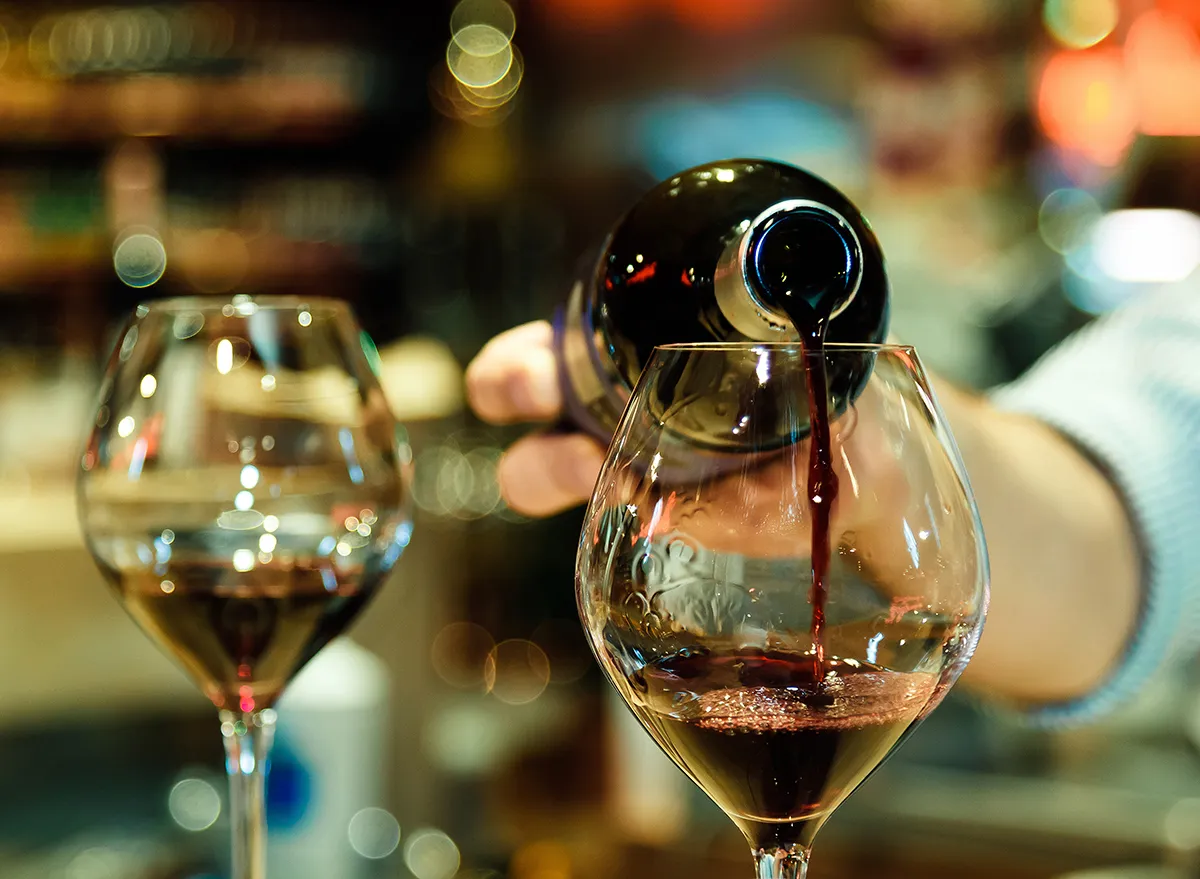
The sulfites and histamines in wine, particularly red wine, are common triggers of congestion, flushing, itching, and other allergy reactions. It doesn't take much. Even a glass of wine can launch a significant allergic reaction, according to the American College of Allergy, Asthma, and Immunology. So imagine what a full bottle can do to you if you're sensitive. We're talking hives, red, itchy eyes, even difficulty breathing.
You may have a terrible night of sleep.

Sure a couple of glasses of wine will make you sleepy, but we can just about guarantee you won't get a good night's sleep after finishing a bottle. Finnish researchers reporting in JMIR Mental Health studied more than 4,000 people and found that those who drank heavily reduced their sleep quality by 39.2%. While alcohol has a sedating effect, it doesn't last long. As your body metabolizes the alcohol over time, your body experiences arousal, a wake-up call, so to speak, just when you feel like sleeping in. If you already have trouble sleeping, maybe put down the bottle of wine and ditch these 9 Eating Habits That Are Hurting Your Sleep, According to Doctors.
Your bowels may let loose.

We probably don't have to tell you what drinking alcohol can do to your gastrointestinal system. But if you're interested, you can read all about how "colonic propulsive motility" is increased after an acute influx of something like a bottle of red.
Your brain will get too much GABA.

GABA is a neurotransmitter in the brain. Drinking alcohol increases GABA activity, which causes neurons to fire slower. It also mucks up the brain's ability to process information. One way that disruption manifests itself in the wine drinker who had three too many is slurred speech. It's an acute problem that will go away by morning, but according to the American Addiction Centers, people who drink excessively are at risk of developing dysarthria, which is the medical term for difficulty saying words. Over time, that brain damage can be permanent. For more booze news, read What Happens To Your Body When You Give Up Alcohol.


